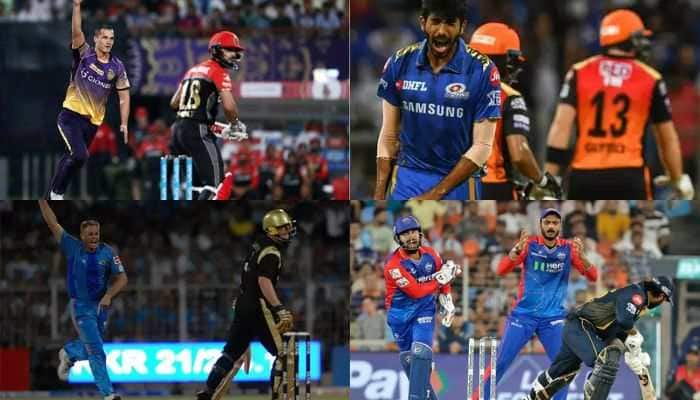GST will end tax terrorism, make consumer the king, says PM Modi
Expressing gratitude to all parties for support, Prime Minister Narendra Modi on Monday described GST as a "crucial step" towards ending tax terrorism besides reducing corruption and black money and said the new regime of indirect taxation will make consumer the "king".
Trending Photos
)
New Delhi: Expressing gratitude to all parties for support, Prime Minister Narendra Modi on Monday described GST as a "crucial step" towards ending tax terrorism besides reducing corruption and black money and said the new regime of indirect taxation will make consumer the "king".
He emphasised in Lok Sabha that the passage of the GST Constitution Amendment Bill by Parliament was not a victory of any party or government but was everybody's victory as it highlighted the success of the democratic ethos of the country.
Intervening in a debate on Constitution (122nd Amendment) Bill, Modi asserted that the GST will benefit mainly those states which are considered backward and address the problem of imbalanced development.
He acknowledged that manufacturing states will suffer losses but said they will be compensated.
"August 8th marks a crucial step towards freedom from tax terrorism," the Prime Minister said, while recalling that this was the day in 1942 when Mahatma Gandhi had sounded the bugle of 'Quit India' which marked a major step towards the country's Independence.
"GST can't be seen as a victory of a party or government. It is the victory for democratic ethos of India and a victory for everyone," he said, while noting that the measure was being supported by all parties, irrespective of different ideologies.
The Prime Minister said the new indirect taxation regime,
which will subsume 7-13 taxes, will help end corruption as traders will be compelled to give proper bills and the consumer will be the "king".
It will also help reduce the problem of black money and lead to generation of jobs by benefitting the small traders and entrepreneurs, he said.
Noting that the GST bill had been firmed up after thorough "churning of ideas", Modi "humbly" expressed happiness that it was being passed through an unprecedented consensus of parties.
He said he had held consultations with his predecessor Manmohan Singh and Congress president Sonia Gandhi on the issue.
"Rashtra Niti (national policy) is above 'Raj Niti' (politics)....I thank all political parties, as also state governments run by different parties. We are taking such a decision.. We have reached here after churning in Lok Sabha, Rajya Sabha, 29 states, their representatives and 90 parties. We are putting a stamp on the final decision," Modi said.
Underlining that the development marks the "recognition of One India" and strengthens this concept, he said, "We are aligning ourselves with new taxation regime.... GST is a new 'moti' (bead) in this 'maala' (necklace)."
He coined the GST in a new manner -- 'Great Step by Team India', 'Great Step towards Transformation', 'Great Step towards Transparency'.
Responding to Congress' contention that GST was its idea being implemented by the NDA government, he acknowledged that all political parties and previous governments had contributed to making of the bill.
In this context, he quipped, "janam koi de, lalan palan koi kare. Krishna ko janam kisne diya, bada kisne kiya? (somebody may give birth, but someone else may nurture. Who gave birth to Lord Krishna and who brought him up?)"
At the same time, he said, "we do not have 'guroor' (arrogance) that his bill is the perfect one" even though "so many brains have made an effort which will have results".
"It (making of GST) is a result of churning but it is true that we cannot be perfect and it cannot be ensured that in future there would not be any drawback," the Prime Minister said.
Underlining that everyone dreams for "Ek Bharat Shreshtra Bharat' (One India, Great India)," he said, "this is not just a taxation system but all states and the Centre will develop a system where small or big accept it."
He expressed happiness that GST bill was not allowed to be politicised and rather became a national matter.
Responding to questions of Congress as to why he had opposed GST earlier in 2011 as Chief Minister of Gujarat, Modi said he had "many apprehensions" at that time and had met the then Finance Minister Pranab Mukherjee many times.
"As Prime Minister, having experience of Chief Minister, I could easily address the concerns of GST," he said, adding "Experience of Chief Ministership helped in addressing the concerns and in removing many drawbacks."
He said there was a crucial need for developing confidence among states as many of them had apprehensions about the Centre compensating them for loss of revenue.
Modi said he had underlined it earlier also that democracy cannot be based on numbers alone but decisions should be taken on the basis of consensus.
"It is true that in Rajya Sabha, the bill could have faced difficulty because of numbers... It is a journey of consensus... And we have to take this journey forward. Therefore, we kept discussion on," he said.
"The important thing is that this should not be decided on majority, we never wanted it...It is our effort to give importance to all views. We know that unprecedented consensus has been created. It helps in strengthing democracy," he said.
Apparently referring to AIADMK which opposed the GST because of certain concerns, the Prime Minister said, "Some people here would be thinking that it should have been this or that way. Despite all, we have made effort to move this forward."
Talking about benefits of GST, Modi said it will usher in simplification of procedures like filling of forms and bring about uniforminity of tax rates and processing.







)
)
)
)
)
)
)
)
)
)
